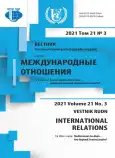A Mediterranean Region? Regional Security Complex Theory Revisited
- 作者: Stivachtis Y.A.1
-
隶属关系:
- Virginia Polytechnic Institute and State University
- 期: 卷 21, 编号 3 (2021): Mediterranean Sea Basin – New Regional Security Complex?
- 页面: 416-428
- 栏目: THEMATIC DOSSIER
- URL: https://journal-vniispk.ru/2313-0660/article/view/320291
- DOI: https://doi.org/10.22363/2313-0660-2021-21-3-416-428
- ID: 320291
如何引用文章
全文:
详细
This article argues that the shift from the bipolar structure of the Cold War international system to a more polycentric power structure at the system level has increased the significance of regional relations and has consequently enhanced the importance of the study of regionalism. It makes a case for a Mediterranean region and examines various efforts aimed at defining what constitutes a region. In so doing, it investigates whether the Regional Security Complex Theory (RSCT) can be utilized to define a Mediterranean region and argues that the patters of amity and enmity among Mediterranean states are necessary but not sufficient to identify such a region. It suggests that economic, energy, environmental, and other factors, such as migration and refugee flows should be taken into consideration in order to define the Mediterranean region. It also claims that the Mediterranean security complex includes three sub-complexes. The first is an eastern Mediterranean sub-complex that revolves mainly - albeit not exclusively - around three conflicts: the Greek-Turkish conflict, the Syrian conflict, and the Israeli-Palestinian/Arab conflict. The second is a central Mediterranean sub-complex that includes Italy, Libya, Albania and Malta and which revolves mainly around migration with Italy playing a dominant role due to its historical ties to both Libya and Albania. The third is a western Mediterranean security sub-complex that includes France, Algeria, Tunisia, Morocco, Spain and Portugal. This sub-complex it centered around France, the migration question and its associated threats, such as terrorism, radicalism, and human trafficking. In conclusion, it is concluded that the Mediterranean security complex is very dynamic as there are states (i.e. Turkey) that seem eager and capable of challenging the status quo thereby contributing to the process of the complex’s internal transformation.
作者简介
Yannis Stivachtis
Virginia Polytechnic Institute and State University
编辑信件的主要联系方式.
Email: ystivach@vt.edu
ORCID iD: 0000-0003-1971-6503
Professor of Political Science, Jean Monnet Chair, Virginia Polytechnic Institute; Associate Chair, International Studies Program Director, Department of Political Science; Director, Center for European Union, Transatlantic and Trans-European Space Studies (CEUTTSS) - A Jean Monnet Center of Excellence; Director of the Diplomacy Lab, Virginia Polytechnic Institute
Blacksburg, Virginia, USA参考
- Ayoob, M. (1983/4). Security in the Third World. International Affairs, 60(1), 41-51.
- Ayoob, M. (1989). The Third World in the system of states. International Studies Quarterly, 33(1), 67-79.
- Ayoob, M. (Ed.). (1986). Regional security in the Third World. London: Groom Helm.
- Brecher, M. (1963). International relations and Asian studies: The subordinate state system of Southern Asia. World Politics, 15(2), 213-235.
- Bull, H. (1977). The anarchical society: A study of order in world politics. London: Macmillan.
- Buzan, B. (1983). People, states and fear. London: Harvester Wheatsheaf.
- Buzan, B. (1991). People, states and fear. 2nd edition. London: Harvester Wheatsheaf.
- Buzan, B., & Rozvi, G. (1986). South Asian security and the great powers. London: Macmillan.
- Buzan, B., & Waever, O. (2003). Regions and powers: The structure of international security. Cambridge: Cambridge University Press.
- Buzan, B., Tromer, E., Waever, O., & Lemaitre, P. (1990). The European security order recast: Scenarios for the post-Cold War era. London: Pinter.
- Buzan, B., Waever, O., & de Wilde, J. (1998). Security: A new framework for analysis. Boulder: Lynne Rienner.
- Cantori, L. J. & Spiegel, S. L. (1970). The international politics of regions: A comparative approach. Englewood Cliffs, NJ: Prentice Hall.
- Cantori, L. J., & Spiegel, S. L. (1973). The analysis of regional international politics: The integration versus the empirical systems approach. International Organization, 27(4), 96-125.
- Cohen, S. B. (2003). Geopolitics of the world system. Lantham: Rowman & Littlefield Publishers.
- Ehteshami, A., Huber, D., & Paciello, M. C. (2017). The Mediterranean reset: Geopolitics in a new age. Chichester, UK: Global Policy.
- Evans, G., Newnham, J., & Newnham, R. (1998). Dictionary of international relations. London: Penguin.
- Gaiser, L., & Hribar, D. (2012). Euro-Mediterranean region: Resurged geopolitical importance. International Journal of Mediterranean Studies, 5(1), 57-69. https://doi.org/10.1007/s40321-012-0002-8
- Haas, M. (1970). International subsystems: Stability and polarity. American Political Science Review, 64(1), 98-123
- Haas, M. (1974). International conflict. Indianapolis: Bobbs-Merrill.
- Hettne, B., Inotai, A., & Sunkel, O. (Eds.). (1999). Globalism and the new regionalism. New York: Macmillan Press, Houndmills and St. Martin’s Press.
- Litsas, S., & Tziampiris, A. (Eds.). (2019). The new Eastern Mediterranean. New York: Springer.
- Little, W. (1987). International conflict in Latin America. International Affairs, 63(4), 589-601.
- Parker, G. (1997). Geopolitika v XX. stoletju. Ljubljana: Fakulteta za družbene vede.
- Roucek, J. S. (1953a.) The geopolitics of the Mediterranean I. The American Journal of Economics and Sociology, 12(4), 347-354.
- Roucek, J. S. (1953b). The geopolitics of the Mediterranean II. The American Journal of Economics and Sociology, 13(1), 71-86.
- Russett, B. (1967). International regions and the international system. Chicago: University of Chicago Press.
- Stivachtis, Y. (2019). Eastern Mediterranean: A new region? Theoretical considerations. In S. Litsas & A. Tziampiris (Eds.), The new Eastern Mediterranean (pp. 45-59). New York: Springer
- Väyrynen, R. (1984). Regional conflict formations. Journal of Peace Research, 21(4), 337-359.
- Väyrynen, R. (1986). Collective violence in a discontinuous world. International Social Science Journal, 38(4), 513-528.
- Waever, O., Buzan, B., Kelstrup, M., & Lemaitre, P. (1993). Identity, migration and the new security agenda in Europe. New York: St. Martin’s Press.
- Waever, O., Lemaitre, P., & Tromer, E. (1989). European polyphony. London: Macmillan.
补充文件









